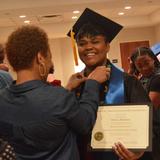- St. Louis College of Health Careers (SLCHC) fosters an environment of positive change and growth within itself, the community, and the greater St. Louis Metropolitan area. The College places special emphasis in assisting the unemployed or underemployed and those seeking to learn new job skills, thus moving individuals closer to full economic independence. SLCHC educates allied health professionals to meet the ever-changing needs of the health care sector. SLCHC develops and refines programs based on current health care trends. Since its founding, the College has embraced those seeking an avenue through which to improve their quality of life. Our goals at St. Louis College of Health Careers, are to Provide a supportive, flexible learning environment, Provide the opportunity for career training, Develop self-sufficient graduates, Provide ongoing outreach and guidance services that develop self-esteem and critical thinking, Assist in employment preparation and job search. St. Louis College of Health Careers has maintained a fundamental educational philosophy since its inception, and is dedicated to meeting the educational needs and professional expectations of its students. The College strives to prepare students to become competent members of the health care community. To this end, the College developed an educational structure that combines theoretical instruction with clinical experience in a specialized field, and believes this combination will best prepare students for technical careers in health care. SLCHC believes that a medical professional is best trained in a health care environment. For this reason, clinical experiences are offered within medical facilities in the St. Louis area, including hospitals, long-term care facilities, doctors? offices, and clinics. This allows clinical instruction in a modern health care environment. Qualified educators and health care professionals supervise both classroom instruction and the clinical experience.
School Highlights
St Louis College of Health Careers-St Louis serves 191 students (58% of students are full-time).
The college's student-teacher ratio of 7:1 is lower than the state community college average of 16:1.
Minority enrollment is 98% of the student body (majority Black), which is more than the state average of 41%.
Quick Facts (2026)
- Enrollment: 191 students
- Acceptance Rate: 100%
- Student-teacher ratio: 7:1
- Minority enrollment: 98%
- Source: Integrated Postsecondary Education Data System (IPEDS)
Top Rankings
St Louis College of Health Careers-St Louis ranks among the top 20% of public schools in Missouri for:
Category
Attribute
School Overview
The teacher population of 28 teachers has stayed relatively flat over five years.
St Louis College of Health Careers-St Louis
(MO) Community College Avg.
Carnegie Classification
Special Focus Two-Year: Health Professions
Baccalaureate Colleges: Diverse Fields
Institution Level
Less than 2 years (below associate)
At least 2 but less than 4 years
Institution Control
Private for-profit
Public
Total Faculty
28 staff
139 staff
Number of Programs Offered
3
16
School Calendar
Student Body
The student population of St Louis College of Health Careers-St Louis has grown by 91% over five years.
The student-teacher ratio of 7:1 has decreased from 31:1 over five years.
The St Louis College of Health Careers-St Louis diversity score of 0.54 is less than the state average of 0.61. The school's diversity has grown by 125% over five years.
Total Enrollment
191 students
2,125 students
Student-Teacher Ratio
7:1
16:1
# Full-Time Students
111 students
718 students
# Part-Time Students
80 students
1,407 students
# Enrollment Undergraduate
191 students
246 students
# Full-Time Undergraduate Students
111 students
834 students
# Full-Time Graduate Students
n/a
11 students
# Part-Time Undergraduate Students
80 students
684 students
# Part-Time Graduate Students
n/a
9 students
Total Dormitory Capacity
n/a
200 students
% American Indian/Alaskan
1%
n/a
% Asian
31%
2%
% Hispanic
1%
6%
% Black
60%
10%
% White
2%
59%
% Hawaiian
2%
1%
% Two or more races
2%
4%
% Non Resident races
n/a
1%
% Unknown races
1%
17%
Diversity Score
0.54
0.61
College Completion Rate (Students who graduate in less than 4 years)
53%
43%
College Completion Rate (Students who graduate in 4 years or more than 4 years)
n/a
62%
Average Graduate Earnings (10 Years)
$25,300
$30,900
Tuition and Acceptance Rate
% Students Receiving Some Financial Aid
91%
91%
Median Debt for Graduates
$12,987
$10,500
Median Debt for Dropouts
$5,117
$5,500
Acceptance Rate
100%
92%
Source: 2024 (or latest year available) Integrated Postsecondary Education Data System (IPEDS) , School Administrators
Frequently Asked Questions
What is the acceptance rate of St Louis College of Health Careers-St Louis?
The acceptance rate of St Louis College of Health Careers-St Louis is 100%, which is higher than the state average of 92%.
What is St Louis College of Health Careers-St Louis's ranking?
St Louis College of Health Careers-St Louis ranks among the top 20% of community college in Missouri for: Average community college minority breakdown.
In what neighborhood is St Louis College of Health Careers-St Louis located?
St Louis College of Health Careers-St Louis is located in the Forest Park Southeast neighborhood of Saint Louis, MO.
Recent Articles

Community College vs. Bootcamps for Tech Careers in 2026
Community college vs. bootcamps in 2026. Compare cost, outcomes, credentials, and hiring trends to choose the best tech career path.

How to Build a Class Schedule That Fits Your Life (Spring 2026)
Learn how to build a class schedule that fits your life with expert tips, updated strategies for Spring 2026, and practical planning tools for students and families.

Top 10 Jobs for Community College Graduates in 2026
Meta Description: Discover high-demand jobs for community college graduates, with current salary trends, costs, and career pathways.







